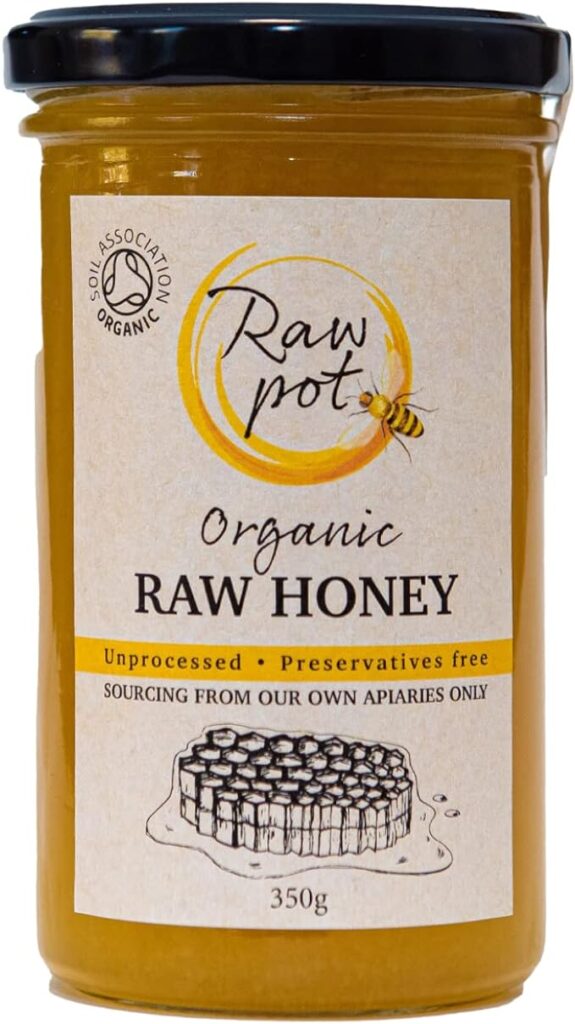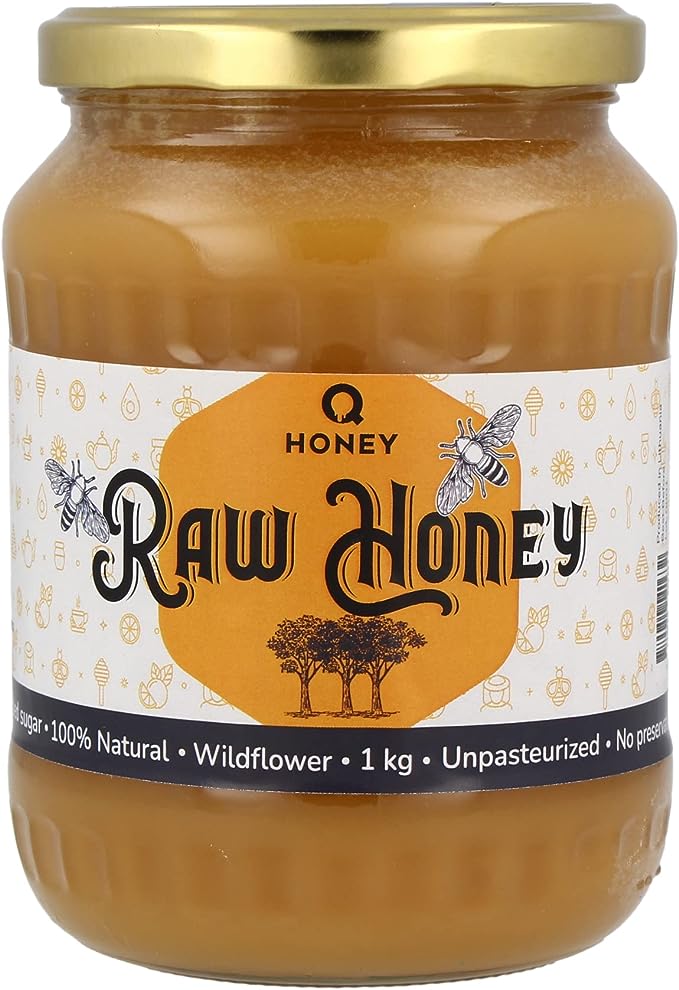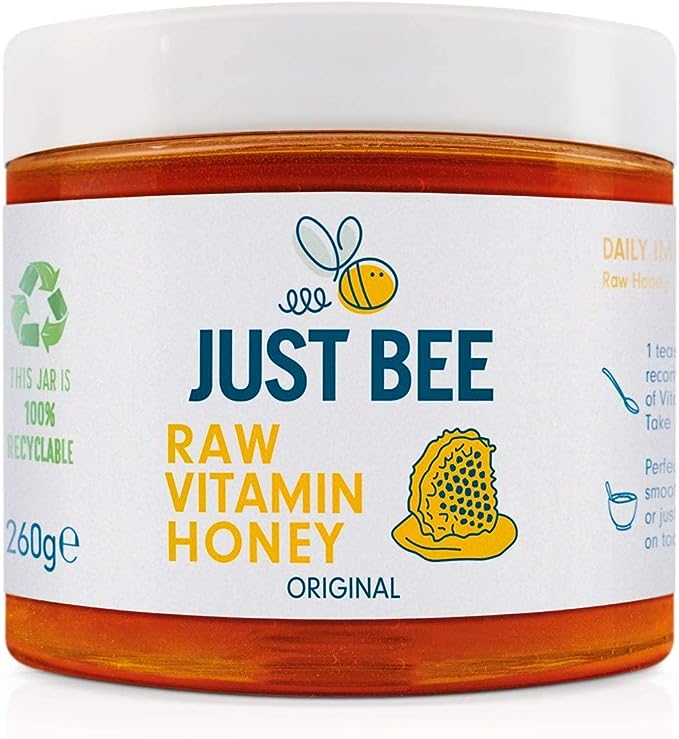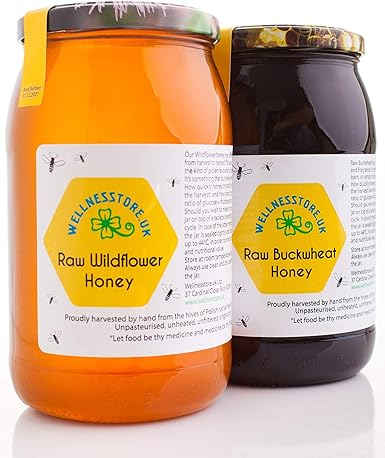Honey has always been a sweet treat and an important food source for humankind for thousands of years. It was the main form of sweetener before cheap sugar was made available. Not only that, honey has long been used for medicinal purposes. But what is raw honey, and why is it better for your health?
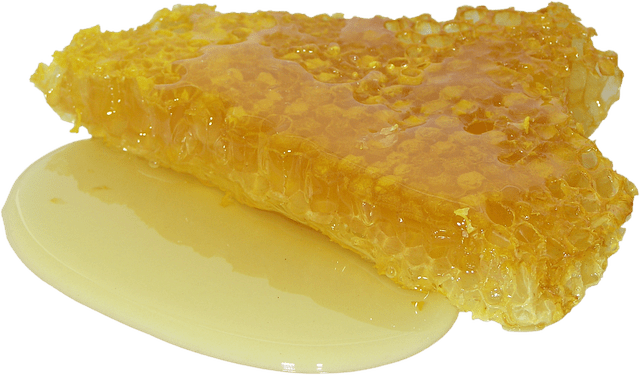
The health benefits of honey are well documented. It contains many antioxidants, enzymes, flavonoids and micro-nutrients that act upon a wide range of conditions and help maintain optimum health. Yet, it is honey in its raw form that really stands out when it comes to medicinal and healthful properties.
What is Raw Honey?
Raw honey comes straight from the bees. You eat it in exactly the same condition as when it was in the bee hive. There is no heating, pasteurising or processing that goes into the final product.
The benefits of raw honey is that all of the goodness in it is preserved, with none lost through processing, unlike standard honey you’ll find on the supermarket shelves.
Here are some key components found in raw honey:
- Sugars: The main component of honey are glucose and fructose, which make up about 70-80% of its total sugar content.
- Water: Honey contains varying amounts of water, usually ranging from 14-18%.
- Enzymes: Raw honey contains enzymes such as diastase, invertase, and catalase. These enzymes play a role in the digestion and absorption of honey.
- Amino Acids: Honey contains small amounts of amino acids, the building blocks of proteins.
- Vitamins and Minerals: Honey contains traces of B vitamins, vitamin C, calcium, iron, and potassium.
- Antioxidants: Honey is rich in antioxidants, which help combat oxidative stress and inflammation in the body.
- Phytonutrients: Honey contains various phytonutrients, which are naturally occurring compounds in plants that have potential health benefits.
- Pollen: Raw honey may contain traces of bee pollen, which is rich in vitamins, minerals, and protein. Some people believe that consuming local honey with pollen may provide allergy relief.
- Propolis: Honeybees produce propolis, a resinous substance, to seal and protect their hives. Propolis has antimicrobial properties and may be present in trace amounts in raw honey.
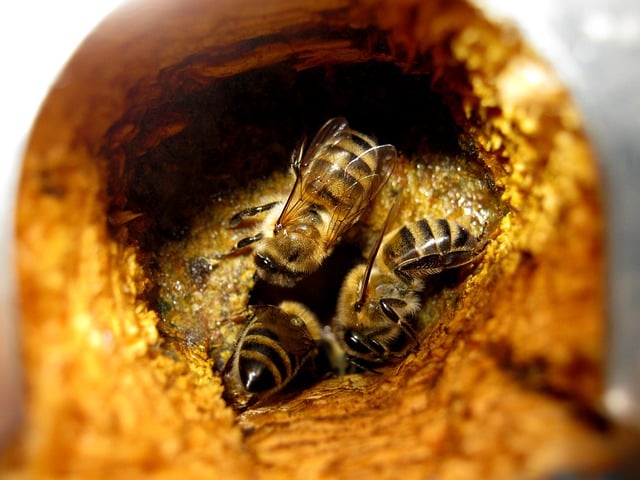
What Does Raw Honey Look Like?
Raw honey is unfiltered, so it won’t have clear finish. It is more likely to look opaque and can be different colours from creamy yellow to a dark brown. It will often contain bits of honeycomb and bee pollen. It will also contain a compound called propolis, which is a green, glutenous substance bees make to build a natural hive. All of this things have added health benefits, adding to the nutritional value of raw honey.
Raw honey from one hive will look different from honey in another area, as the bees will have had access to different species of flowers.
Is Raw Honey Safe?
While it may be true that raw honey has been something our ancestors ate for millennia, we live in a very different world today. There is more pollution and chemicals used in agriculture and back gardens for pest control than ever before, and as a result pesticides and herbicides can find their way into honey as bees gather nectar from affected flowers.
Pollution affects all honey, not just raw. So how do you get to enjoy all the health benefits of honey without worrying about it being contaminated?
One way is to do your research. When you want to buy raw honey, choose honey from organic bee hives. To be labelled as ‘organic’, honey has to pass rigorous standards.
How can honey be organic, when bees can fly anywhere to collect pollen?
Good question. Bees can fly three or four miles away from their hives in their efforts to gather pollen. They will also use any nearby water source they can find. Is there any way to guarantee that pollen collected is from organically grown flowers? No, not unless the hive is surrounded by miles of organically grown plants.
The good news is that organic honey producers often place their hives in wild areas, away from major agriculture, or where surrounding crops or trees are grown to organic standards. For example, Raw Pot Organic Honey has been harvested from bees that forage for pollen growing in certified organic land.
Honey labelled as organic will have been made to the strictest organic principals as possible, and no medicines or chemical pest control treatment is used to treat the bees in the hives.
So, although organic honey can never be guaranteed to be truly organic, it will contain much less chemical residues than anything on a supermarket shelf.
Health Benefits of Raw Honey
Antibacterial – The antibacterial properties of honey make it an excellent treatment for wounds, scalds and burns. Before the invention of penicillin as a drug, honey was often used to treat infections.
One type of honey that is rich in antibacterial properties is Manuka honey, made from the pollen of the Manuka plant. Studies have shown it’s more effective at fighting different types of bacteria than other honeys.
Skin conditions – acne, eczema, dry skin… the antibacterial and moisturising effects can help soothe skin problems. Eating more honey, as well as applying it to skin, will bring the most benefits.
Boosts immune system – Have you noticed how so many cold remedies contain honey? Honey is full of antioxidants, vitamins and minerals essential to health. It can soothe sore throats and ease a cough, as well as giving you energy to get through the day if you’re feeling peaky.
Helps ease allergies – Suffer with hay fever? Try eating local honey! Eating local honey is thought to work by desensitising the immune system to the pollens in your local area, helping the body to lessen its reaction.
Where Can I Buy Raw Honey?
Raw honey can sometimes be hard to find, but it is available in specialist health food stores. You might also find it at farmers markets.
There is also raw organic honey you can buy online. Click on the links below to find out more.
Eating raw honey will give you a host of health benefits and a natural flavour that’s closer to what our ancestors would have tasted. But that’s not the only sweet thing about eating raw honey… knowing you are supporting bee keepers, and making raw organic honey something that is more in demand, is something to bee proud of (apologies for the pun).
Your opinions matter! That way we can all learn something new… so what do you like about eating raw honey? How has it benefited your health? Please add your comment!


